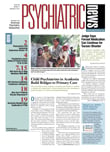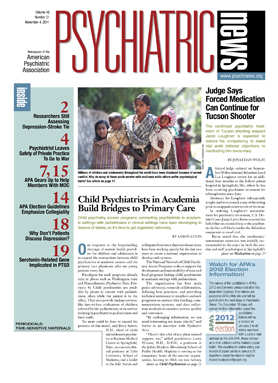One response to the longstanding shortage of mental health providers for children and adolescents is to expand the connections between child psychiatrists in academic centers and the primary care physicians who see young patients every day.
Paradigms for such programs already exist in places such as Washington state and Massachusetts (Psychiatric News, February 4). Child psychiatrists are available by phone to consult with pediatricians, often while the patient is in the office. They also provide backup services, like face-to-face evaluations of children referred by the pediatricians or in-service training in psychiatry to pediatricians and their staffs.
Yet more could be done to expand the presence of this model, said Barry Sarvet, M.D., chief of child and adolescent psychiatry at Baystate Medical Center in Springfield, Mass., an associate clinical professor at Tufts University School of Medicine, and a leader in the field. Sarvet and colleagues from more than two dozen states have been working quietly for the last two years to create a national organization to develop such systems.
The National Network of Child Psychiatry Access Programs seeks to support the development and sustainability of state and local programs linking child psychiatrists in academic settings with pediatricians.
The organization has four main goals: advocacy, research collaboration, defining best practices, and providing technical assistance to members and new programs on matters like funding, communications systems, and data collection methods to monitor service quality and outcomes.
"By exchanging information, we can avoid reinventing too many wheels," said Sarvet in an interview with Psychiatric News.
"There's also a lot of just plain mutual support, too," added psychiatrist Larry Wissow, M.D., M.P.H., a professor at the Johns Hopkins Bloomberg School of Public Health. Hopkins is serving as the temporary home of the nascent organization, hosting its Web site (see below), while program administrator Irene Tanzman at the Massachusetts Behavioral Health Partnership in Boston coordinates activities.
Traditional Roles Need to Change
"Most of the people involved in starting these programs are doing it in addition to whatever they usually do, and also potentially departing from traditional roles for child psychiatry, even from traditional C/L roles," Wissow told Psychiatric News.
The local programs vary given the nature of the populations each serves and the involvement of local governments and medical institutions. However, making available the tools and experience of successful programs to each state group seemed a useful way to increase access to effective mental health care support for primary care providers.
The concept may be simple, but making it work in the real world is more complex, said Wissow. "There are patterns of staffing needs that can be shared rather than discovered independently, and protocols for managing different types of consultations and for evaluating their impact."
Another major question is funding. Different mechanisms are often cobbled together to make a given system work. Often there is a mix of state monies and insurance payments.
In Massachusetts, for instance, funding comes from the state budget through the Department of Mental Health, explained Sarvet. Some program costs are offset by fees charged for face-to-face evaluations of patients, including Medicaid or commercial insurance payments.
However, most costs lie in the delivery of activities other than in-person patient evaluations, such as telephone consultation or care coordination, that are not paid for by insurance and so need some government or other outside funding, Sarvet explained.
"We are currently seeking commercial insurance support for the program through various advocacy strategies," he said.
Why Insurers May Be Interested
Some insurers are interested in the programs because they might reduce costs either by using mental health resources more efficiently or by shifting some mental health spending to primary care.
One unusual funding mechanism is used in Louisiana, where money from the BP oil spill settlement supports outreach efforts to affected communities, said Mary Margaret Gleason, M.D., an assistant professor in the departments of pediatrics and psychiatry and behavioral sciences at Tulane University School of Medicine.
Many of those communities and the children who live in them had high rates of poverty and prior trauma from disasters like Hurricane Katrina even before the oil spill, said Gleason.
The program in Louisiana includes a "warmline" staffed by two child psychiatrists from Tulane for 15 hours a week who can advise local pediatricians about managing individual patients. They can also arrange for face-to-face assessments in New Orleans for complicated cases, for which the psychiatrists write up detailed evaluations and treatment recommendations. In addition, they serve more generally as sources of psychiatric information for participating pediatricians, either over the phone or by delivering training in the pediatricians' offices.
The National Network of Child Psychiatry Access Programs has informal connections with the American Academy of Pediatrics and was planning to seek a formal endorsement from the American Academy of Child and Adolescent Psychiatry at the academy's annual meeting late last month, said Sarvet. Ultimately, it may also explore development of a link with APA.

